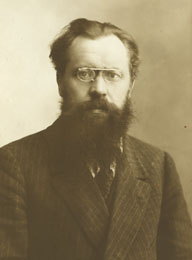Juhan Lilienbach
Juhan lilies Bach (pseudonyms Lilleoja , Lilleoru and Mürgioja ; born October 12 . Jul / 24. October 1870 greg. In Paatna , Lääne-Viru County ; † 9. May 1928 in Leningrad ) was an Estonian poet and publisher .
Life
Lilienbach attended the community school in Paatna and then worked as an unskilled worker in Rakvere , Illuka and Jõhvi . During this time he also collected Estonian folk poetry. In 1901 he went to Tallinn , where he worked in a port office and joined social democratic circles. From 1905 he published literature supporting the revolution , from 1909 in his own publishing house Mõte ('Thought'). In 1918 he left Tallinn with the retreating Bolsheviks and settled in Petrograd . Here he worked for the publication of Estonian books in the Soviet Union until his death from a heart disease.
Literary and publishing work
Lilienbach made his debut as a poet in newspapers at the end of the 19th century. After his turn to socialism, his poems became increasingly political, so that the Finnish writer Aino Kallas found nothing worth reading about them in a review. Still, his satirical and atheistic, anti-clerical poems deserve special mention. With the latter, in particular, he continued the tradition of Estonian folk poetry. Although only one volume of poetry was published in his life and the number of his poems is not great, he embodies a special tradition within Estonian poetry. He has also emerged as the author of epigrams .
More important was his activity as a publisher and publicist. He edited numerous newspapers, magazines and anthologies, and repeatedly came into conflict with the censorship authorities. In addition to Marxist non-fiction, he also edited important contemporary literature such as works by Eduard Vilde . With the latter he conducted extensive correspondence, especially since Vilde was also part of social democratic circles.
bibliography
- Ommikulaulud ('morning songs '). Tallinn: Mõte 1909. 124 pp.
literature
- Liis Raud: J. Lilienbachi kirjad E. Vildele, in: Paar sammukest eesti kirjanduse ja rahvaaluule uurimise teed. Uurimusi yes I materjale . Tallinn: Eesti Riiklik Kirjastus 1958, pp. 290-354.
- Helmut Tarand: Omaette peatükk eesti ateismi ajaloos, in: Keel ja Kirjandus 12/1959, pp. 714–720.
- M. Leemets: Juhan Lilienbach, in: Looming 10/1965, pp. 1594–1596.
- Helmut Tarand: Epigrammimeistrit meenutades. J. Lilienbach 24.X 1870-9.V 1928, in: Looming 10/1970, pp. 1563-1568.
Web links
Individual evidence
- ↑ Eesti kirjanike leksikon. Koostanud Oskar Kruus yes Heino Puhvel. Tallinn: Eesti Raamat 2000, pp. 294-295.
- ↑ Aino Kallas: Vaades Eesti viimase aasta ilukirjanduse kohta, in: Eesti Kirjandus 1911, pp. 90-98, here pp. 97f.
- ↑ Helmut Tarand: Omaette peatükk eesti ateismi ajaloos, in: Keel ja Kirjandus 12/1959, p. 714.
- ↑ Helmut Tarand: Epigrammimeistrit meenutades. J. Lilienbach 24.X 1870-9.V 1928, in: Looming 10/1970, pp. 1563-1568.
- ↑ Cornelius Hasselblatt : History of Estonian Literature. From the beginning to the present. Berlin, New York: De Gruyter 2006, p. 405.
- ^ Liis Raud: J. Lilienbachi kirjad E. Vildele, in: Couple sammukest… . Tallinn 1958, pp. 290-354.
| personal data | |
|---|---|
| SURNAME | Lilienbach, Juhan |
| ALTERNATIVE NAMES | Lilleoja (pseudonym); Lilleoru (pseudonym); Mürgioja (pseudonym) |
| BRIEF DESCRIPTION | Estonian poet and publisher |
| DATE OF BIRTH | October 24, 1870 |
| PLACE OF BIRTH | Paatna , Lääne-Viru County |
| DATE OF DEATH | May 9, 1928 |
| Place of death | Leningrad |
